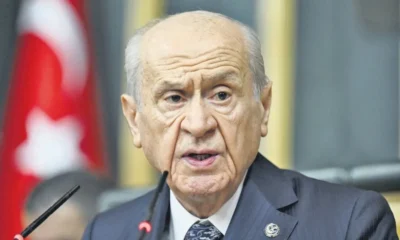Economy
Ferrero to acquire century-old cereal maker WK Kellogg for $3.1B
Italian confectioner Ferrero, known for brands like Nutella and Kinder, said Thursday it would acquire the century-old U.S. cereal company WK Kellogg in a deal valued at approximately $3.1 billion.
The Ferrero Group said it will pay $23 for each Kellogg share. The transaction includes the manufacturing, marketing and distribution of WK Kellogg Co.’s portfolio of breakfast cereals across the U.S., Canada and the Caribbean.
WK Kellogg’s shares were up 30% in premarket trading on Thursday on reports of the acquisition that was later confirmed.
Kellogg, which was founded in Battle Creek, Michigan, in 1906, makes Fruit Loops, Special K, Frosted Flakes and Rice Krispies.
The current company was formed in 2023, when Kellogg’s snack brands like Cheez-Its and Pringles were spun into a separate company called Kellanova. M&M’s maker Mars Inc. announced last year that it planned to buy Kellanova in a deal worth nearly $30 billion.
Ferrero Group, which was founded in Italy in 1946, has been trying to expand its U.S. footprint. In 2018, it bought Nestle’s U.S. candy brands, including Butterfinger, Nerds and SweeTarts. And in 2022, it bought Wells Enterprises, the maker of ice cream brands like Blue Bunny and Halo Top.
The deal, which still needs approval from Kellogg shareholders, is expected to close in the second half of the year. Once the transaction is complete, Kellogg’s stock will no longer trade on the New York Stock Exchange and the company will become a Ferrero subsidiary.
Economy
Turkish firms move to help restore Syria infrastructure, advance trade
A top business delegation from Türkiye met with Syrian President Ahmad al-Sharaa in Damascus on Friday to discuss opportunities for economic cooperation and the reconstruction of the war-torn country’s industrial and commercial infrastructure.
Türkiye has supported opposition forces in Syria throughout the 13-year civil war that ended in December with the ousting of longtime dictator Bashar Assad. It is now positioning itself to play a major role in the neighboring country’s rebuilding.
Turkish companies now see big opportunities after a lifting of long-standing U.S. sanctions, which severed Syria from the global financial system, cleared the way for investment in postwar reconstruction.
The delegation from the Union of Chambers and Commodity Exchanges of Türkiye (TOBB) arrived in Damascus on Thursday and attended a meeting with top officials, including Minister of Economy and Industry Nidal al-Shaar and the representatives of the Syrian business world.
On Friday, the delegation was received by al-Sharaa for a meeting that TOBB President Rifat Hisarcıklıoğlu described as “highly productive,” emphasizing Türkiye’s commitment to the principles of good neighborly relations.
“We discussed areas of potential commercial collaboration. Syrian authorities expressed strong interest in partnering with Turkish companies. I believe we will see a rapid advancement in bilateral trade and economic relations,” Hisarcıklıoğlu said in a statement.
Ankara has pledged to help rebuild Syria’s economy, including by providing natural gas. And Ziraat, Türkiye’s top state bank, has said it would step in to support its banking sector when conditions are right.
Syria’s economic recovery
The delegation engaged in a series of bilateral meetings with Syrian counterparts, focusing on restoring the country’s industrial and commercial infrastructure, he noted. “We are closely following Syria’s normalization process and fully support its territorial integrity and efforts to rebuild national unity,” Hisarcıklıoğlu stated.
Construction, transportation and manufacturing firms from Türkiye are poised to play a major role in repairing the damage, which the U.N. estimates at nearly $1 trillion.
Hisarcıklıoğlu said that TOBB is ready to contribute to providing support to ensure the success of efforts toward economic development and help Syria’s economic recovery.
“We discussed how we can contribute to Syria’s reconstruction, how we can revitalize the private sector and entrepreneurship, and how we can enhance the trade volume between the two countries,” Hisarcıklıoğlu said.
“Turkish companies can play a significant role in many sectors, especially infrastructure, construction, energy, food, and logistics.”
Energy
The meeting with al-Sharaa came a day after Energy and Natural Resources Minister Alparslan Bayraktar said Türkiye would provide 2 billion cubic meters of natural gas to Syria each year.
Gas exports to Syria will contribute to an additional 1,300 megawatts of electricity production in the country, Bayraktar told a joint news conference with his Syrian counterpart Mohammed al-Bashir in Damascus.
Türkiye will also provide an additional 1,000 megawatts of electricity to Syria for its short-term needs, he added.
Al-Bashir said they agreed to activate a gas pipeline that connects Syria with Türkiye, with gas flows expected in June.
The two ministers discussed completing a 400-kilovolt line that links the countries, contributing to importing around 500 megawatts of electricity into Syria, to be ready by the end of the year or shortly thereafter, he added.
Cooperation also includes opening the door for Turkish companies to invest in mining, phosphate, electricity generation and electricity distribution in Syria.
OIZ, border expertise
Hisarcıklıoğlu emphasized that the Turkish business community can share its expertise, particularly in organized industrial zones (OIZs) and the modernization of land border gates, and that joint efforts can be undertaken in these areas.
“We have tremendous experience in OIZs. Since the 1990s, OIZs have spread across Anatolia, accelerating the industrialization process. Today, there are more than 400 OIZs throughout Türkiye. Companies located in these zones account for 45% of total industrial production and provide employment to approximately 2.7 million people. Thanks to this OIZ model, Türkiye has become an industrial country,” he explained.
Hisarcıklıoğlu added that land border gates in Türkiye were modernized by the chamber and the commodity exchange community and that the project was selected by the United Nations as the best worldwide and presented as a model.
“Our land border gates, which now operate more efficiently and effectively, have seen a sharp increase in traffic volume, while freight costs for our exporting companies have decreased. We want to bring all these experiences to Syria. Technical work is needed for this. In bilateral meetings, we conveyed the need to establish a working group on this matter,” he said.
Trade
Hisarcıklıoğlu emphasized that transportation activities between Türkiye and Syria have recently gained momentum, and trade in the region has been revitalized.
In the first five months of 2025, 110,000 shipments were made from Türkiye to Syria, marking a 60% increase compared to the same period last year, he noted.
“There are over 30,000 companies established by Syrians in Türkiye, 6,000 of which operate in the manufacturing sector,” Hisarcıklıoğlu said.
He noted that bilateral trade between Türkiye and Syria had dropped from $2.5 billion to $486 million during the civil war. But it has rebounded to $2.5 billion, despite the challenges of war, thanks to the contributions of Syrian-founded businesses in Türkiye, he added.
As of 2024, Türkiye became Syria’s largest trading partner, with Syrian entrepreneurs playing a major role in this development, according to Hisarcıklıoğlu.
“This creates a significant advantage for deeper cooperation between Türkiye and Syria in the new period,” he added.
Economy
Türkiye’s current account deficit narrows to 7-month low
Türkiye’s current account deficit narrowed to $684 million in May, official data showed on Friday, the lowest gap the country recorded since October last year.
The current account has posted deficits for seven consecutive months, following a surplus of $2.2 billion last October.
In the first five months of this year, the deficit totaled $21.04 billion, the Central Bank of the Republic of Türkiye (CBRT) data showed.
The May figure came in below market expectations, as a Bloomberg survey had forecast a deficit of $900 million, while Reuters projected $830 million, with analysts expecting the full-year gap to double to $20 billion compared to the previous year.
Excluding gold and energy, the current account posted a surplus of nearly $4.1 billion in May, according to the CBRT data.
The goods trade balance, adjusted for balance of payments methodology, posted a $4.8 billion deficit for the month.
On a 12-month rolling basis, the current account deficit stood at approximately $16 billion, while the adjusted foreign trade deficit was reported at $61 billion.
Türkiye’s services sector continued to deliver strong foreign exchange inflows. In May, the net inflow from services amounted to $5.64 billion, of which $4.37 billion came from tourism-related travel income.
Foreign direct investment (FDI) contributed $702 million, while portfolio investments saw a net inflow of roughly $2.5 billion.
One of the most notable developments was in official reserves, which recorded a $13.47 billion increase.
Economy
Trump to hike Canada tariff to 35%, eyes up to 20% levies for others
President Donald Trump escalated his trade offensive against Canada on Thursday, announcing that the U.S. would implement a 35% tariff on Canadian imports next month, alongside plans to impose broad tariffs of 15% to 20% on most other trading partners.
The hike in import taxes deepens a rift between two North American countries that have suffered a debilitating blow to their decades-old alliance.
In a letter released on his social media platform, Trump told Canadian Prime Minister Mark Carney the new rate would go into effect on Aug. 1 and would go up if Canada retaliated.
In a post on social media platform X late on Thursday, Carney said his government will continue to defend Canadian workers and businesses in their negotiations with the U.S. as they work toward that deadline.
The 35% tariff is an increase from the current 25% rate that Trump had assigned to Canada and is a blow to Carney, who was seeking to agree a trade pact with Washington.
An exclusion for goods covered by the United States-Mexico-Canada Agreement (USMCA) on trade was expected to stay in place, and 10% tariffs on energy and fertilizer were also not set to change, though Trump had not made a final decision on those issues, an administration official said.
Trump complained in his letter about what he referred to as the flow of fentanyl from Canada as well as the country’s tariff- and non-tariff trade barriers that hurt U.S. dairy farmers and others. He said the trade deficit was a threat to the U.S. economy and national security.
“If Canada works with me to stop the flow of Fentanyl, we will, perhaps, consider an adjustment to this letter,” Trump wrote.
Canadian officials say a minuscule amount of fentanyl originates from Canada, but they have taken measures to strengthen the border.
“Canada has made vital progress to stop the scourge of fentanyl in North America. We are committed to continuing to work with the United States to save lives and protect communities in both our countries,” Carney added in his X post late Tuesday.
The prime minister said last month that he and Trump had agreed to wrap up a new economic and security deal within 30 days.
EU tariffs worry
Trump has broadened his trade war in recent days, setting new tariffs on a number of countries, including allies Japan and South Korea, along with a 50% tariff on copper.
His latest salvo rattled investors anew, with U.S. and European stock futures dipping in Asia on Friday as markets nervously awaited word on what tariff Trump would assign the European Union later on Friday.
The potential escalation between the EU and the U.S. is a big deal for financial markets,” said Joseph Capurso, head of international economics at the Commonwealth Bank of Australia. “If you get something similar to (the U.S.-China trade war in April), that’s going to be very destabilising.”
In an interview with NBC News published on Thursday, Trump said other trading partners that had not yet received such letters would likely face blanket tariffs.
“Not everybody has to get a letter. You know that. We’re just setting our tariffs,” Trump said in the interview.
“We’re just going to say all of the remaining countries are going to pay, whether it’s 20% or 15%. We’ll work that out now,” Trump was quoted as saying by the network.
Myanmar’s ruling military general has asked Trump to reduce the 40% tariff rate on his country’s exports to the U.S. to 10%-20% and is ready to send a negotiation team to Washington if needed, state media reported on Friday.
The president of the Philippines will meet Trump in Washington this month for the first time and will discuss its 20% tariff, the country’s foreign minister said.
Canada is the second-largest U.S. trading partner after Mexico, and the largest buyer of U.S. exports. It bought $349.4 billion of U.S. goods last year and exported $412.7 billion to the U.S., according to U.S. Census Bureau data.
Carney, who led his Liberal Party to a comeback election victory earlier this year with a pledge to tackle trade challenges with the U.S., had been aiming to negotiate a trade deal with its key trading partner by July 21.
Trump, in his letter, did not specifically address how trade negotiations were proceeding, but he said the “tariffs may be modified, upward or downward, depending on our relationship with your Country.”
Last month, the Carney government scrapped a planned digital services tax targeting U.S. technology firms after Trump abruptly called off trade talks saying the tax was a “blatant attack.”
Economy
Turkish Treasury secures $1.75B in Eurobond issue amid strong demand
The Turkish Treasury said on Friday it borrowed 1.5 billion euros ($1.75 billion) in a Eurobond issue with maturity in 2031 and a 5.2% yield.
In a statement, the Treasury and Finance Ministry said it received more than three times the demand for the size of the issuance, which is part of Türkiye’s 2025 external financing program.
The transaction was finalized on Thursday, with BNP Paribas, Citibank, ING Bank and Standard Chartered mandated as joint bookrunners.
The issuance attracted participation from around 140 investors, the statement said. Eurobonds were sold to investors from Britain, the United States, European countries and the Middle East, among others.
The Treasury has borrowed a total of $8.75 billion from international markets so far this year.
Economy
UAE tops list of Türkiye’s fastest-growing export markets in H1
The United Arab Emirates (UAE) was the country where Türkiye increased its exports the most in value terms in the first half of the year, with shipments rising 64.5% to nearly $3.3 billion, according to a report Thursday.
Türkiye’s total exports from January to June rose 4.1% year-over-year to $131.4 billion, Anadolu Agency (AA) reported, citing data from the Turkish Exporters Assembly (TIM).
In June alone, exports increased 8% from a year earlier to $20.5 billion.
The automotive sector led all industries in export value during the first half, with $19.99 billion in sales. It was followed by chemicals and chemical products at $15.76 billion and the electrical-electronics sector at $8.33 billion.
Exports to the UAE increased by $1.28 billion compared to the same period last year, rising from $1.98 billion to $3.26 billion – a 64.5% jump. That marked the largest increase in value among all export markets.
Germany followed with an increase of $804.8 million, the U.K. with $685 million, Slovenia with $643.6 million, and Italy with $479 million.
In total, exports during the first half amounted to $9.72 billion to Germany, $6.56 billion to the U.K., $6.4 billion to Italy and $1.74 billion to Slovenia.
UAE 10th largest export market
Türkiye’s top 10 export markets in the first half were Germany, the U.K., Italy, the U.S., Spain, France, Iraq, Romania, the Netherlands and the UAE.
The jewelry sector was the leading Turkish exporter to the UAE, with $1.81 billion in shipments during the six-month period. Other top sectors included chemicals and chemical products ($250 million), electrical and electronics ($135.6 million), steel ($94.6 million), grains and pulses ($87.5 million), and ready-to-wear and apparel ($66.7 million).
Istanbul-based companies accounted for the largest share of exports to the UAE, totaling $1.63 billion. They were followed by companies in Çorum with $1.06 billion, Izmir with $72.2 million and Ankara with $69.7 million.
Mehmet Ali Akarca, head of the Turkey-UAE Business Council at the Foreign Economic Relations Board (DEIK), said the figures reflect the strong level of economic cooperation between the two countries.
“The growth is not only the result of commercial potential but also of strengthening diplomatic relations and mutual trust,” he told AA.
Rise supported by CEPA
Akarca noted that the increase in exports was supported by the Comprehensive Economic Partnership Agreement (CEPA), which came into effect in 2023.
“With CEPA, the reduction in customs tariffs and elimination of technical barriers have simplified trade procedures,” he said.
He added that the UAE’s strategic geographic location, strong infrastructure and business-friendly environment make it a valuable trade hub.
“Despite having a population of just 10 million, the UAE plays a key role in global trade. Turkish firms are increasingly establishing offices there,” he said.
Cities like Dubai and Abu Dhabi, Akarca noted, serve as gateways to Asian, European and African markets, offering major logistical advantages with their modern ports, air cargo hubs and free trade zones.
He also said that the UAE’s role as a re-export center helps boost demand for Turkish goods in the Middle East, Africa and South Asia.
Looking ahead, Akarca said sectors such as digital technologies, health care, food, construction and defense are expected to gain importance in Turkish exports to the UAE.
“During our sectoral delegation visit for digital technologies last year, we saw strong interest in artificial intelligence, cybersecurity, fintech and software,” he said. “There’s also growing demand for food security and health care services, creating long-term partnership opportunities.”
He added: “The defense sector is also on the rise due to evolving geopolitical dynamics and technological transformation.”
Economy
Trump slaps Brazil with 50% tariff, says copper levy due on Aug. 1
U.S. President Donald Trump announced on Wednesday he would introduce a steep 50% tariff on Brazil, as he blasted the trial of the country’s ex-leader, and said a U.S. “national security” levy on copper would begin in August.
In a letter addressed to Brazilian President Luiz Inacio Lula da Silva, Trump criticized the treatment of his right-wing ally Jair Bolsonaro as an “international disgrace.”
Bolsonaro is facing trial over accusations he plotted a coup after his narrow 2022 election loss to Lula.
In response to Trump’s tariff letter, Lula warned of possible reciprocation, writing on X that “any unilateral tariff increases will be addressed in light of the Brazilian Law of Economic Reciprocity.”
Brazil earlier on Wednesday said it had summoned the U.S. charge d’affaires over Trump’s previous criticism of the Bolsonaro trial.
The 50% U.S. tariff on Brazilian goods will take effect Aug. 1, Trump said in his letter, mirroring a deadline that dozens of other economies face.
On that same date, a 50% tariff on U.S. imports of copper – a key metal used in green energy and other technologies – will take effect, Trump announced Wednesday evening on social media.
He said the move followed a “robust NATIONAL SECURITY ASSESSMENT,” likely alluding to a Department of Commerce investigation into copper launched earlier this year.
“Copper is the second most used material by the Department of Defense!” Trump said.
Escalation threats
Trump’s message to Lula was the latest in more than 20 such letters the U.S. president has released since Monday, after repeatedly threatening to simply decide a rate for countries as negotiations continue over his elevated “reciprocal” tariffs.
Brazil had not been among those threatened previously with duties above a 10% baseline, and the U.S. runs a goods trade surplus with Brazil.
On Wednesday, Trump also addressed letters to leaders of the Philippines, Sri Lanka, Brunei, Algeria, Libya, Iraq and Moldova, spelling out duties ranging from 20% to 30% that would also take effect on Aug. 1.
Similar to a first batch of documents published Monday, the levels were not too far from those originally threatened in April, although some partners received notably lower rates this time.
While Trump in April imposed a 10% levy on almost all trading partners, he unveiled – and then withheld – higher rates for dozens of economies.
The deadline for those steeper levels to take effect was meant to be Wednesday, before Trump postponed it further to Aug. 1.
Countries that faced the threats of elevated duties began receiving letters spelling out U.S. tariff rates on their products.
In the messages, Trump justified his tariffs as a response to trade ties that he says are “far from Reciprocal.”
The letters urged countries to manufacture products in the U.S. to avoid duties, while threatening further escalation if leaders retaliated.
Other countries that have received Trump’s letters include key U.S. allies Japan and South Korea, as well as Indonesia, Bangladesh and Thailand.
EU deal in ‘coming days’?
Analysts have noted that Asian countries have been a key target so far.
But all eyes are on the state of negotiations with major partners who have yet to receive such letters, including the European Union.
The Trump administration is under pressure to unveil more trade pacts. So far, Washington has only reached agreements with the U.K. and Vietnam, alongside a deal to temporarily lower tit-for-tat levies with China.
Trump on Tuesday said his government was “probably two days off” from sending the EU a letter with an updated tariff rate.
An EU spokesperson said Wednesday the bloc wants to strike a deal with the U.S. “in the coming days,” and has shown readiness to reach an agreement in principle.
Apart from tariffs targeting goods from different countries, Trump has rolled out sector-specific duties on steel, aluminum and autos since returning to the White House in January.
-

 Economy3 days ago
Economy3 days agoTurkish business union leads push for Syria’s reconstruction
-

 Daily Agenda2 days ago
Daily Agenda2 days agoBAKLAVA arrested bribes in the box
-

 Daily Agenda2 days ago
Daily Agenda2 days agoIf we forget, our blood is dry – last minute news
-

 Politics3 days ago
Politics3 days agoMethane exposure kills 12 Turkish soldiers in Iraq
-

 Politics2 days ago
Politics2 days agoTürkiye’s ruling AK Party to chart the future in strategic workshop
-

 Refugees2 days ago
Refugees2 days agoTurkey bans Musk’s AI chatbot Grok for offensive content
-

 Daily Agenda2 days ago
Daily Agenda2 days agoHard warning from Bahçeli to Özel: No, are you thinking of a coup? Let’s see the streets and see
-

 Sports2 days ago
Sports2 days agoSüper Lig transfer frenzy heats up with Kökçü, Osimhen, Rashford




